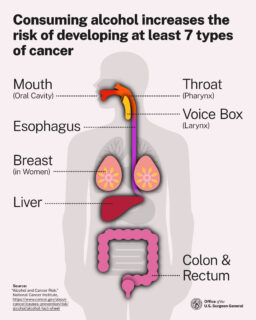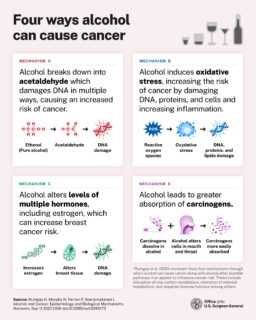If you drink alcohol, you may be at risk of getting cancer. You may not like to hear this, but the facts cannot be ignored. Organizations like the International Agency for Research on Cancer (IARC) have classified alcoholic beverages as a Group 1 Carcinogen. Let that sink in. And this past month, a U.S. Surgeon General report highlighted the cancer risks of alcohol consumption and called for warning labels on alcoholic products. Here are the 7 types of cancer directly linked to drinking alcohol, and why you should keep reading!
Key Summary of this article
- Not enough people know about the dangers of alcohol. In fact, drinking alcohol is largely glamorized and even attributed, at times, to longevity. All of which is misleading, as research indicates that there are 7 types of cancer linked to alcohol consumption.
- This is due to acetaldehyde, a toxic by-product of alcohol metabolism, which directly damages your DNA. It also promotes tumor development, which is why alcohol is considered a significant carcinogen.
- If you reduce your intake, or better still, quit drinking alcohol, you’ll decrease your cancer risk. In fact, oral and esophageal cancers show a 50% or greater reduction after 20 years of abstinence.
Surgeon General’s Advisory is a public statement that calls for action
When the U.S. Surgeon General issues an advisory, it’s a public statement to get people’s attention to an urgent public health issue. It also provides recommendations for addressing the issue.
The advisory, issued in January 2025, highlights alcohol use as a leading preventable cause of cancer in the United States. Drinking alcohol contributes to nearly 100,000 cancer cases and about 20,000 cancer deaths each year.
When will people wake up to the perils of drinking alcohol?
We at Longevity have been sharing our concerns with our readers for years. Yet, the world is overloaded with information and misinformation, so, understandably, millions of people remain unaware of the dangers of alcohol to their longevity.
If you’re seeking a better health span, to live longer free of disease, then keep reading!
Alcohol consumption is too common
According to the U.S. Surgeon General’s report, “Alcohol use is very common. In 2019-2020, 72% of U.S. adults reported they consumed one or more drinks per week, but less than half of U.S. adults are aware of the relationship between alcohol consumption and cancer risk.”
“The direct link between alcohol use and cancer was first established in the late 1980s, and the evidence for this link has strengthened over time.”
This body of scientific evidence demonstrates a causal relationship between alcohol use and an increased risk for at least seven different types of cancer. These include the breast (in women), colorectum, esophagus, liver, mouth (oral cavity), throat (pharynx), and voice box (larynx).
The more you drink alcohol, the more you’re at risk
 The more alcohol consumed, the greater the risk of cancer. For certain cancers, like breast, mouth, and throat cancers, evidence shows that this risk may start to increase at around one or fewer drinks per day.
The more alcohol consumed, the greater the risk of cancer. For certain cancers, like breast, mouth, and throat cancers, evidence shows that this risk may start to increase at around one or fewer drinks per day.
A million preventable cancer cases
According to the (1) report, “In 2019, an estimated 96,730 cancer cases were related to alcohol consumption, including 42,400 in men and 54,330 in women. This translates to nearly 1 million preventable cancer cases over ten years in the U.S. The largest burden of alcohol-related cancer in the U.S. is for breast cancer in women, with an estimated 44,180 cases in 2019, representing 16.4% of the approximately 270,000 total breast cancer cases in women.
Globally, 741,300 cancer cases were related to alcohol consumption in 2020; 185,100 of those cases were related to consumption of approximately two drinks daily or fewer.”
Drinking alcohol is linked to several types of cancer
Experts (1,2) say the risk is dose-dependent,
Hence, the more alcohol we drink, the higher the risk. Even light to moderate drinking can increase your cancer risk.
This past month (January 2025), the U.S. Surgeon General (2) noted that alcohol is the third leading preventable cause of cancer in the United States, after tobacco and obesity.
My grandmother drank a lot of alcohol and lived long, so why should I give up?
I’m often told (in response to my articles or in conversation), “well my grandmother (or father) drank a lot, and they lived past 80.” Or, “You can drink a few glasses a week, and it’s good for you.” Or, “I love drinking alcohol. Don’t be a killjoy! And anyway, I don’t believe these findings, there’s not much conflicting information out there, and I will take my chances they’re wrong.”
Sadly, it’s just not that simple!
Health risks are based on several factors
We all know that one’s risk varies based on several factors. These include the frequency of alcohol consumption, genetic predispositions, and other lifestyle factors.
Whichever way you want to slice and dice it, when you reduce or eliminate alcohol intake, you can lower the risk of developing alcohol-related cancers.
Again, the evidence indicates that the more alcohol a person drinks—particularly the more alcohol a person drinks regularly over time—the higher his or her risk of developing an alcohol-associated cancer. (2)
Here are 4 ways alcohol can cause cancer
- First, it breaks down into acetaldehyde, which damages DNA in multiple ways.
- It induces oxidative stress, which increases inflammation and damages DNA, proteins, and cells.
- 3. Alcohol also alters the levels of many hormones, including estrogen, which can increase breast cancer risk.
- Carcinogens from other sources, such as those found in tobacco, can dissolve in alcohol, making them easier for the body to absorb.
Who is most at risk?
Even those who have no more than one drink per day and binge drinkers (those who consume 4 or more drinks for women and 5 or more drinks for men in one sitting) have a modestly increased risk of some cancers. (2)
In 2020, 741,300 cancer cases worldwide were attributable to alcohol consumption.
Women are more at risk than men. (1).
Women who drink less than one unit of alcohol per week have a 16.5 per cent greater chance of developing cancer, and the risk increases to 21.8 per cent for those having one alcoholic drink per day.
About four more women out of 100 would develop breast cancer as a result of consuming two alcoholic drinks a day.
For men, the risk of developing cancer was 10 percent, rising to 13.1 percent with two alcoholic drinks per day.
Why should we care?
My concern is that too many people are still not aware that alcohol is considered a Group One Carcinogen (1,2).
Managing longevity outcomes is a holistic effort. You need to understand all the risk factors and weigh them up against your lifestyle needs and desires.
If you knew that every time you drink, alcohol is washing your body with toxins that can trigger or exacerbate cancer, would you keep drinking?
Ultimately, you’re the CEO of your health. Your body is your temple and the only one you have in this lifetime. It is your choice how you live your life. No one escapes lifestyle choices as we age. There is no silver bullet or miracle fix. Anyone who has had a cancer diagnosis and survived it will attest to this.
If you care about how long you live in good health and are prepared to modify your food, sleep, and exercise to improve your longevity, then perhaps it’s time to rethink your relationship with alcohol.
References
From our Longevity archives
Articles to help you understand the link between alcohol and damage to your longevity.




![women [longevity live]](https://longevitylive.com/wp-content/uploads/2020/01/photo-of-women-walking-down-the-street-1116984-100x100.jpg)










